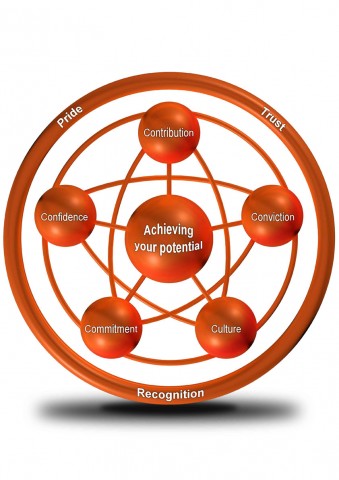Written by Lakshmi Gopalkrishnan
Through her company, Infinite Impact, Lakshmi offers her expertise as a High-Performance keynote speaker, executive leadership coach, and master facilitator for Dr. Brené Brown’s Dare to Lead™.
When you stumble or fall, what do you say to yourself?
Scenario 1
You put yourself out there: try something new, aim high, or speak up for what is right. In short, you step out of comfort into courage. It’d be great if you scored a tidy win. But instead, you stumble. You crash.
Do you…
- Beat yourself up?
- Doubt your abilities?
- Compare yourself to others?
I’ve done all those things. In fact, if I’m being honest, I used to see them as proof of diligence, discipline, and a high bar.
Can anyone reading this relate?
Scenario 2
Now, think of someone you care for—a family member, friend, or beloved client—who did those brave things: trying something new, aiming high, or speaking up for what’s right. And they stumbled. They crashed.
How would you respond in their moment of despair? Would you doubt their abilities, beat them up, or compare them unfavorably to others?
Or would you:
- Tell them you’re proud of them?
- Remind them you’re in their corner?
- Applaud their courage and resilience?
I know you’d applaud, support, and encourage them. I would, too.
Every. Single. Time.
So why do we beat ourselves up when WE’RE the ones being brave?
Here’s a simple tip paraphrasing Dr. Kristin Neff, who researches the science of self compassion:
Treat yourself like someone you love.
Use that voice. Use those words.
This was HARD for me. I was 100% able to extend compassion and empathy to many, but extending it to myself felt weak. As in, self-compassion = self-indulgence.
My clients—kind, generous, fierce, and tender leaders who didn’t see themselves how the rest of us saw them, people I care for deeply and am honored to partner with—inspired me to build the muscle.
Here is a short daily practice that I coach—and practice myself. It works for me because I’m usually tired, and this is SIMPLE:
- I name three things I’m grateful for.
- For anything where I took a chance and crashed, I honor the courage it took to try: “It would have been so much easier not to do that—great job trying.”
Building this muscle has been transformative for me. It’s helped me find the resilience, confidence, and optimism to turn many stumbles into steppingstones—and stay in the game.
Next time you stumble, try treating yourself like someone you love. That voice. Those words.
Even if it’s two steps forward and one step back, honor the courage it took to try.

Lakshmi Gopalkrishnan
I want to give special thanks to Lakshmi Gopalkrishnan for this post. We met in 2012 while training to be coaches at CTI in San Rafael, California. We completed a fast-track program and a rigorous certification that changed our lives.
Today, I collaborate with individuals, teams, and organizations using a powerful combination of coaching, branding, and marketing communications to inspire happiness and drive higher performance.
Through her company, Infinite Impact, Lakshmi offers her expertise as a High-Performance keynote speaker, executive leadership coach, and master facilitator for Dr. Brené Brown’s Dare to Lead™. Follow Lakshmi on LinkedIn for more energizing posts.





 In Happiness at Work: Maximizing your Psychological Capital for Success (2010), author Jessica Pryce-Jones takes her research with more than 3,000 respondents from 79 countries and gets to the heart of what drives happiness and (this is so cool!) found that
In Happiness at Work: Maximizing your Psychological Capital for Success (2010), author Jessica Pryce-Jones takes her research with more than 3,000 respondents from 79 countries and gets to the heart of what drives happiness and (this is so cool!) found that  At the center of the Performance-Happiness Model is believing that you are achieving your potential. This is important because that belief makes you happy, and the statistics around happy versus unhappy employees are staggering.
At the center of the Performance-Happiness Model is believing that you are achieving your potential. This is important because that belief makes you happy, and the statistics around happy versus unhappy employees are staggering.


